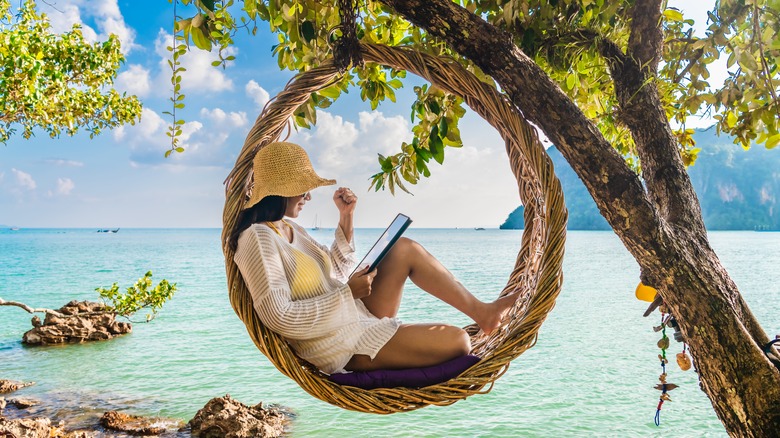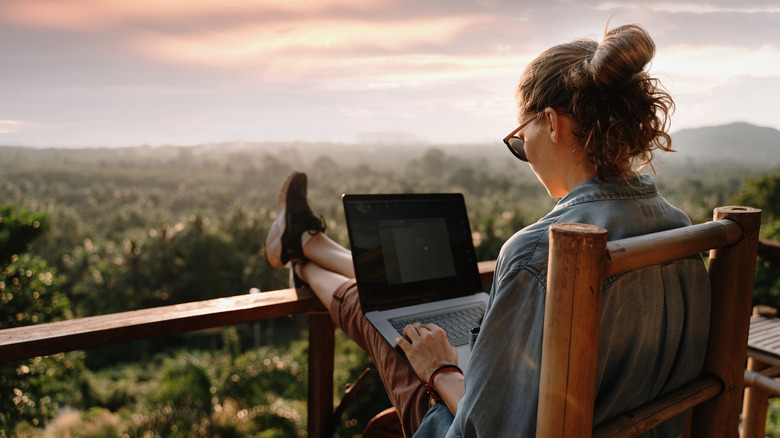What Is Bleisure Travel And Why Is It Increasing In Popularity?
There's an emerging trend in travel and it's called bleisure. It's a portmanteau of "business" and "leisure," and it describes how business travelers add some leisure time alone or with family before or after fulfilling their work responsibilities, such as attending events. Bleisure is not a new concept — the term was coined back in 2009 — but it has gained some momentum following the pandemic.
And, it doesn't appear to be a fad either, with some travel experts going as far as saying that bleisure will be "the new business trip" (via the American Hotel & Lodging Association). In 2018, i.e., before the pandemic, Expedia Group found that, on average, more than 60% of business travelers extended their trips to enjoy some leisure time. This figure increased in 2021, with TravelPulse reporting that 89% of business travelers planned to extend their vacation for some personal time within a year.
Who travels for bleisure?
Bleisure travelers either go on a trip alone or with a group, with those attending a convention or conference (43%) most likely also including some leisure to their travel than those going on an offsite team outing (24%) or a sales trip (9%), according to Expedia Group. While millennials and those in the tech industry may have started bleisure travel, the trend has now become more mainstream. The National Car Rental State of Business Travel Survey found that 86% of millennials, 76% of Gen-Xers, and 73% of boomers extended their work trips to include some leisure time.
Bleisure has also expanded beyond tech professionals. "When we started, we'd just get people from the tech industry," Outsite founder Emmanuel Guisset told the Financial Times. "It has spread to creatives and consultants, and now more corporate types with families. We've also hosted bankers for the first time during [COVID]."
Furthermore, the Global Business Travel Association (GBTA) noted that those in middle management (42%) do more bleisure travel than executives (31%) and entry-level employees (27%). "It's people from all different levels: we thought it might be more entry-level, but we found managerial does it as well," Jeanne Liu of the Global Business Travel Association told the BBC. "It's opportunistic: it depends if you're going to a place you like and that you want to spend time in."
Why is bleisure travel becoming more popular?
The opportunity lies in the fact that you're basically going on a vacation for less, and who doesn't want that? Your employer will be paying for the airfare and accommodation, at least during the business portion of your travel. However, what you'll have to shell out will still be less than if you had paid for the entire trip yourself.
And with COVID-19 travel restrictions still in place, it makes sense to make your journey worthwhile by extending a few days at your destination for some rest and relaxation. "Executives have been asked by their companies to reduce travel, on top of the [pandemic-related] restrictions, so this has meant they take longer stays in destinations," Matteo Atti of VistaJet said at a Financial Times conference. "They place many more meetings in one trip and they often end up mixing work and private time."
An extended stay also means you have more time to explore the place and learn about its culture. Plus, the ability to bring along our loved ones makes the vacation more memorable. As a result, bleisure travelers are able to achieve work/life balance. "Travel wellbeing relates to job satisfaction, which means people stay productive and stay longer in their jobs," Jeanne Liu explained to the BBC.


